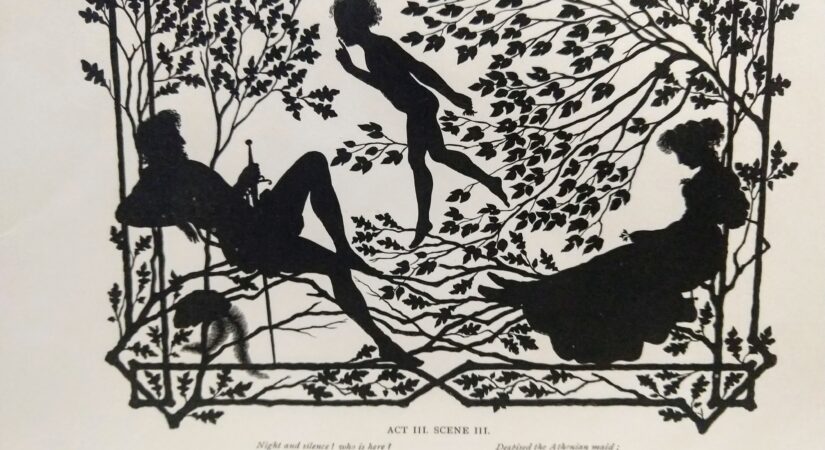Date / Time
- December 15, 2022
6:00 pm - 7:30 pm - January 5, 2023
6:00 pm - 7:30 pm - January 19, 2023
6:00 pm - 7:30 pm - February 2, 2023
6:00 pm - 7:30 pm - February 16, 2023
6:00 pm - 7:30 pm
Sponsored by Lenore H. Steiner and Perry A. Lerner
Registration
- Tuition for this course is $250. 10% off for Rosenbach members and the Delancey Society. Not a member? Learn more.
- This course is limited to participants who are 18 years of age or older.
- This is a virtual program held over Zoom.
- Please check your spam folder for your email confirmation. If you have questions, please call (215) 732-1600 or email [email protected].
- Registration opens for Delancey Society members on July 18, for members on July 25, and for the general public on August 1.
Course Description
Shakespeare’s plays are full of fantastical elements and entities, including fairies, witches, ghosts, and magicians. But how should we read these otherworldly appearances in Shakespeare? How were such things viewed in the early modern period? How were they depicted on stage? And how might the answers to such questions change our understanding of the plays? We know that magic, science, and religion were less clearly delineated during Shakespeare’s lifetime than they are today, but how might these blurred cultural beliefs affect our interpretation of individual playtexts? Using the Fantastic as a frame for reading the plays, this course will explore four of Shakespeare’s better-known works—one comedy, two tragedies, and one romance. Our discussion of each play will proceed from the questions and interests of the participants, but we will begin with a focus on fairies and lovers in A Midsummer Night’s Dream, witches and fate in Macbeth, ghosts and the afterlife in Hamlet, and magic and spirits in The Tempest. In addition to examining the Fantastic in Shakespeare, we will develop a basic understanding of the material conditions of the early modern stage and the poetic conventions of early English verse. Ideally, this course will be quite interactive, combining brief lecture materials with open conversations. Every time we meet, we will practice a variety of reading techniques that will enable participants to begin experiencing Shakespeare’s plays more deeply and effectively on their own, recognizing each text not only as a narrative story but also as a poetic script that was meant to be performed.
Course Texts
A Midsummer Night’s Dream, edited by Barbara A. Mowat and Paul Werstine (ISBN 978-0-7434-7754-3)
Macbeth, edited by Barbara A. Mowat and Paul Werstine (ISBN 978-0-7434-7710-9)
Hamlet, edited by Barbara A. Mowat and Paul Werstine (ISBN 978-0-7434-7712-3)
The Tempest, edited by Barbara A. Mowat and Paul Werstine (ISBN 978-0-7434-8283-7)
Shakespeare Fantastic syllabus
About the Instructor
Dr. Jim Casey is a Fulbright Fellow, National Endowment for the Humanities grant recipient, Past President of the International Association for the Fantastic in the Arts, editor of Shakespeare and Fletcher’s Two Noble Kinsmen, and co-editor of the collection Shakespeare/Not Shakespeare. Although primarily a Shakespearean, he has published peer-reviewed essays on such diverse topics as fantasy, monstrosity, early modern poetry, medieval poetry, pedagogy, textual theory, performance theory, postmodern theory, adaptation theory, digital humanities, old age, comics, anime, masculinity, grief, the supernatural, Shakespeare, Chaucer, Ovid, Firefly, and Battlestar Galactica.
About Rosenbach Courses
Revisit beloved classics or experience new ones with Rosenbach courses. Book lovers delve into fiction, history, and poetry with the guidance of a literary expert and the company of other readers. See all upcoming courses.
By registering for this program, you will be added to The Rosenbach’s email database to receive future communication about programs and events. If you’d prefer not to receive these messages please email [email protected]g with ‘unsubscribe’ in the subject line.
Image Caption: Shakespeare’s A Midsummer-Night’s Dream, designs by P. Konewka, Roberts Brothers, Boston, 1870
Date / Time
- December 15, 2022
6:00 pm - 7:30 pm - January 5, 2023
6:00 pm - 7:30 pm - January 19, 2023
6:00 pm - 7:30 pm - February 2, 2023
6:00 pm - 7:30 pm - February 16, 2023
6:00 pm - 7:30 pm

